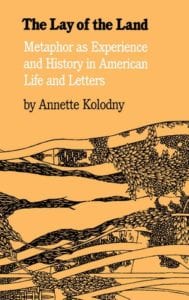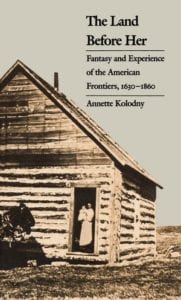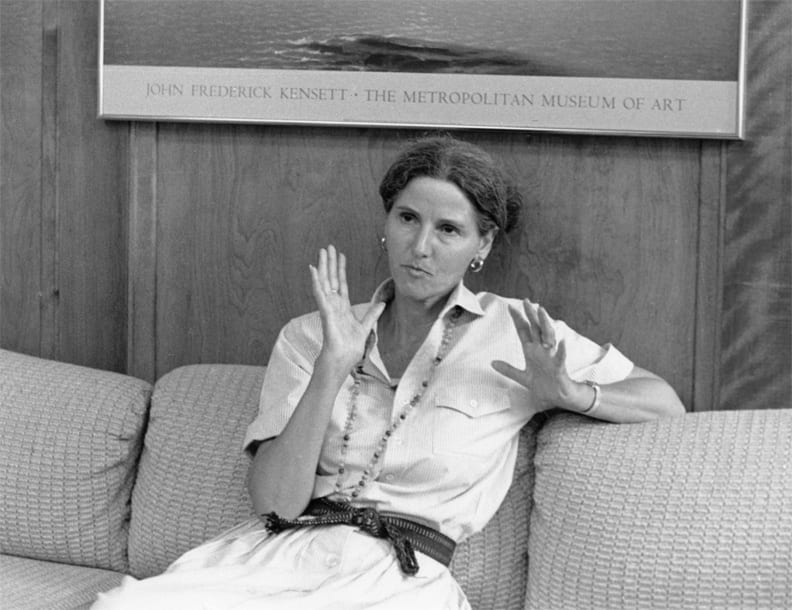By Amy Hamilton, Northern Michigan University
Dr. Annette Kolodny, a leading voice in Early American literary studies and a founding ecofeminist scholar, died on September 11, 2019 at her home in Tucson, Arizona. Dr. Kolodny’s work has inspired countless ASLE members, and she was also a friend, teacher, and mentor to many of us in the field. Her loss will be deeply felt.
 She received her BA from Brooklyn College, CUNY in 1962, and her PhD from the University of California, Berkeley in 1969. In 1975 Dr. Kolodny published her first monograph, The Lay of the Land: Metaphor as Experience and History in American Life and Letters (University of North Carolina Press). The Lay of the Land examines how early Europeans and Euroamericans justified exploration and nation building through language and imagery that gendered the land as female and therefore open and available for male domination. Nine years later she followed up on this work with the publication of The Land Before Her: Fantasy and Experience of the American Frontiers, 1630-1860 (University of North Carolina Press 1984), a study of early European and Euroamerican women’s experiences settling and living in a landscape that had already been imagined as female. Together these critiques form some of the first inquiries into the field of environmental literary criticism, now known as ecocriticism. More specifically, with their analyses of the relationships between the rhetorical and material treatments of women and land, The Lay of the Land and The Land Before Her are widely recognized as founding texts in ecofeminism.
She received her BA from Brooklyn College, CUNY in 1962, and her PhD from the University of California, Berkeley in 1969. In 1975 Dr. Kolodny published her first monograph, The Lay of the Land: Metaphor as Experience and History in American Life and Letters (University of North Carolina Press). The Lay of the Land examines how early Europeans and Euroamericans justified exploration and nation building through language and imagery that gendered the land as female and therefore open and available for male domination. Nine years later she followed up on this work with the publication of The Land Before Her: Fantasy and Experience of the American Frontiers, 1630-1860 (University of North Carolina Press 1984), a study of early European and Euroamerican women’s experiences settling and living in a landscape that had already been imagined as female. Together these critiques form some of the first inquiries into the field of environmental literary criticism, now known as ecocriticism. More specifically, with their analyses of the relationships between the rhetorical and material treatments of women and land, The Lay of the Land and The Land Before Her are widely recognized as founding texts in ecofeminism.
 Dr. Kolodny’s work in ecocriticism and ecofeminism continued to develop and guide the field in new directions. Namely, in the 1990s and early 2000s her voice joined with other key scholars who were working to expand the reach of ecocriticism beyond the white male nature writer. Among her many publications, she authored “Letting Go Our Grand Obsessions: Notes Toward a New Literary History of the American Frontiers” (American Literature 1992) and “Rethinking the ‘Ecological Indian’: A Penobscot Precursor” (ISLE 2007), two articles that helped lay the groundwork for scholars and activists invested in reimaging the boundaries and possibilities of the field. Beginning in 2002, the Environment and Culture Caucus of the American Studies Association has recognized Dr. Kolodny’s significance to the fields of ecocriticism, ecofeminism, and the environmental humanities by awarding the annual Annette Kolodny Prize (supported by Orion Magazine and Duke University Press) to the best environmentally-themed paper presented at the ASA annual meeting.
Dr. Kolodny’s work in ecocriticism and ecofeminism continued to develop and guide the field in new directions. Namely, in the 1990s and early 2000s her voice joined with other key scholars who were working to expand the reach of ecocriticism beyond the white male nature writer. Among her many publications, she authored “Letting Go Our Grand Obsessions: Notes Toward a New Literary History of the American Frontiers” (American Literature 1992) and “Rethinking the ‘Ecological Indian’: A Penobscot Precursor” (ISLE 2007), two articles that helped lay the groundwork for scholars and activists invested in reimaging the boundaries and possibilities of the field. Beginning in 2002, the Environment and Culture Caucus of the American Studies Association has recognized Dr. Kolodny’s significance to the fields of ecocriticism, ecofeminism, and the environmental humanities by awarding the annual Annette Kolodny Prize (supported by Orion Magazine and Duke University Press) to the best environmentally-themed paper presented at the ASA annual meeting.
Dr. Kolodny was actively involved with ASLE from the earliest days, serving on the ASLE Advisory Board (1993-2003) and on the ISLE Advisory Board (1995-2005). Her scholarship and guidance are familiar to many ASLE members, whether through her books and articles, her conference papers and plenaries, or her generous mentorship. At the 2001 ASLE meeting her work was honored as “a cornerstone of the field of ecocriticism” at a Plenary Session entitled “Tribute to Annette Kolodny—The Multicultural Future of Ecocriticism: Celebrating the 25th Anniversary of Annette Kolodny’s The Lay of the Land,” and in 2004 ASLE presented her with a Lifetime Honorary Membership.
In addition to her scholarly contributions, Dr. Kolodny’s impact has been perhaps most powerful and poignant in her exemplary mentorship of emerging scholars. An advisor to the very end, even while she was under hospice care she was having long conversations with former students – inquiring into our lives and work, providing support and insightful career advice. While it is difficult to quantify the influence of one scholar on an entire field, let alone a field as diverse and interdisciplinary as ecocriticism, it is abundantly clear that Annette Kolodny’s presence will be felt in the ASLE community for generations of scholars to come.
*For a comprehensive obituary, please see the September 20, 2019 edition of The New York Times.

